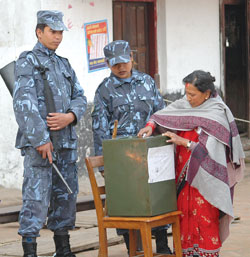|
|
What do Girija Prasad Koirala, Madhab Kumar Nepal, and Pushpa Kamal Dahal have in common? Like a broken record, they all keep insisting on sticking to the June deadline for elections to the constituent assembly. None offer a coherent reason why elections are so important by June except to say that regressive elements will take advantage if polls are deferred.
And yet, if only all of them were to seriously think for once, they would see why the artificial deadline of June can tear this country apart.
To hold credible elections that form an inclusive and legitimate constituent assembly, a few key conditions must be in place. There must first be a legal framework that allows all constituents to participate in the assembly elections. An environment must then be created that guarantees freedom from threats and intimidation. The elections, finally, must be held according to acceptable standards so that the results are seen as legitimate.
None of these conditions exist today. The comprehensive peace agreement and interim constitution are so myopic that they have barred anyone other than the eight parties from contesting the polls. That means the legal framework does not exist to allow for true participation. Even if the laws are changed and new ones introduced, it is unclear whether that will allow all interested constituents to participate. The recent madhesi movement and janajati agitation were a direct result of this myopia.
As for the political and civil space needed for free elections, it doesn't exist. Though most Maoist weapons are now inside UNMIN containers, Maoist behaviour in the field is still intimidating and threatening. Worse, there is no monitoring mechanism to check their behaviour. Policing is patchy, thin, and corrupt, and the only national monitoring institution was disbanded last November without a replacement in place.
Talk to any of the district cadres of the other major parties. They will tell you how constricted the space for free politics is. With the tarai and janajati votes now moving out of the Maoists' orbit, such behaviour by nervous Maoist cadres will only grow.
All this means the basic acceptable standards for elections just do not exist, and it is not likely they will come into place in the three months left till June. Even if we were to speed up things now, negotiations with the traditionally marginalised communities will likely take months before an acceptable compromise on participation and representation is reached. Adequate policing and monitoring of civil and political space will require concerted action by all sides, including by the Maoists, who just don't seem interested in allowing that. This means only one thing: no credible elections in June.
If the June deadline is stuck to, the elections will be flawed, with results contested and atmosphere poisoned-not a good recipe for constitution-making.
Sticking with such flawed elections is more dangerous than delayed elections because of the potential that it will increase lawlessness, create new conflicts, and fragment the state. Imagine the effect that would have on the fidgety Maoist combatants in their cantonments.
So why not declare the inevitable now: postpone the polls until all necessary conditions are met. This must be backed up with urgent work on strengthening the cantonment logistics and, crucially, reforming the security services so that Maoist fighters have some hope of finding jobs in a reformed security sector.
Otherwise, we may agree to defer the polls only to see the fighters come out of the camps to cause mayhem in the countryside.




